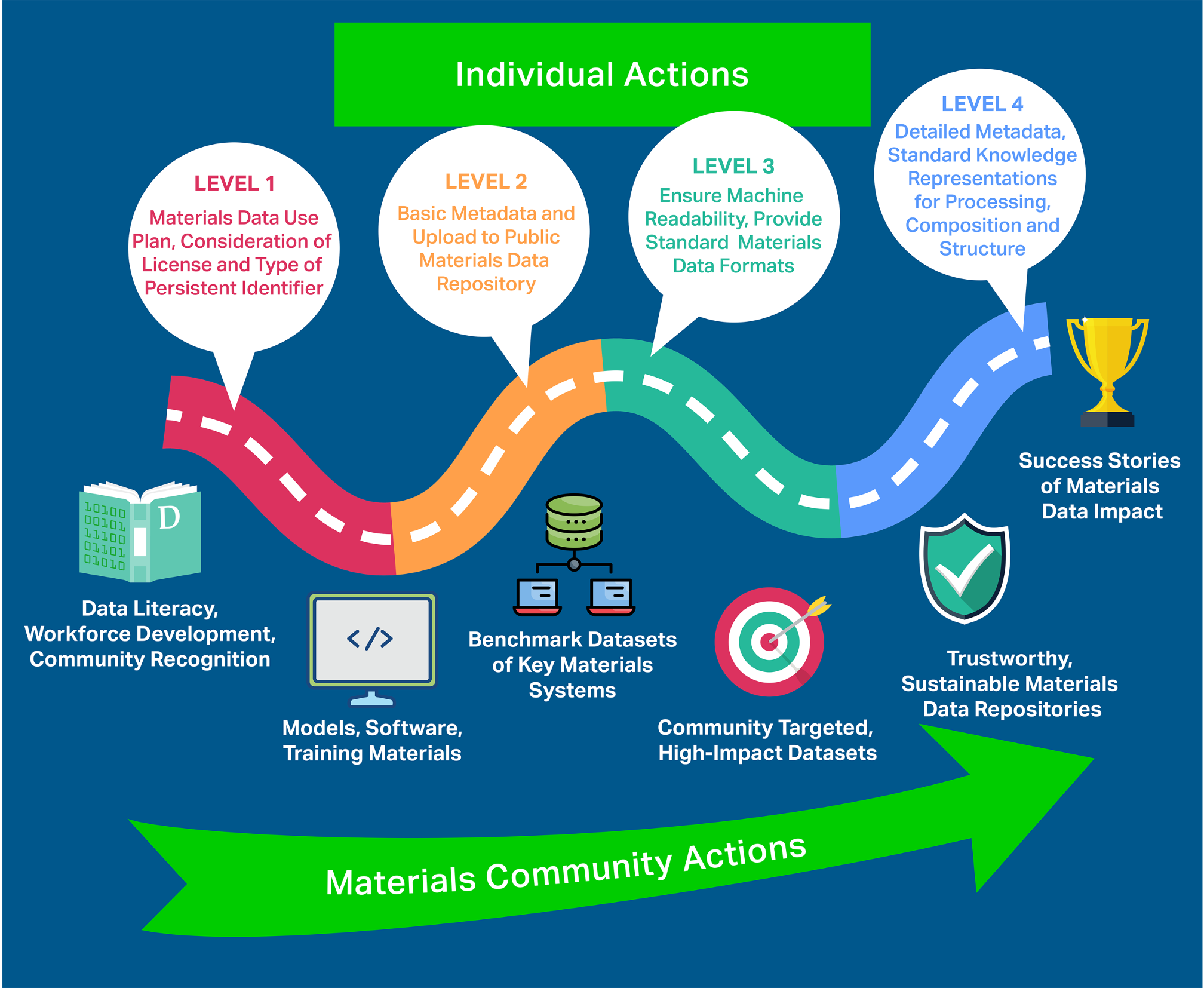PARADIM Highlight #77—Education and Outreach (2023)
L.C. Brinson (Duke), L.M. Bartolo (Northwestern), B. Blaiszik (Argonne), D. Elbert (JHU/PARADIM), I. Foster (Uchicago), A. Strachan (Purdue), P.W. Voorhees (Northwestern)
PARADIM co-created a community-action roadmap for widespread implementation of FAIR principles to unleash an era of data reuse and fuel Materials Genome Initiative (MGI) accelerations of discovery, design, and deployment. The work was a collaboration of the Materials Research Data Alliance (MaRDA) Working Group on FAIR Principles that identified four levels of actions for individual research groups to make their data more FAIR as well as community-level actions to enable FAIR and create resources that provide high-value and incentives to enact FAIR. FAIR data for Materials is a cornerstone of the Materials Genome Initiative (MGI) Strategic Plan to fuel accelerated discovery, design, and deployment of new materials.

The roadmap, left, shows: 1) definitions of four levels of individual actions data producers can use to participate in FAIR for structured (e.g. tabular values) or unstructured (e.g. images) data; and 2) actions the community can work on to create knowledge, acceptance, and value in materials FAIR data. These include training for workforce development, creation of FAIR for models and software that use shared data, benchmark and community datasets for validation and high-impact outcomes; development of trust and sustainability in repository resources; and a system to reward those creating and sharing data in impactful ways.
Co-leadership of community action creating a roadmap for implementation of FAIR principles for materials data. Such implementation is a foundational requirement of MGI Strategic Plan goals. PARADIM participated in a Materials Research Data Alliance (MaRDA) Working Group collaboration to engage researchers, publishers, and data repository teams to identify major barriers to FAIR implementation in both practice and culture within materials science and engineering. The Working Group identified four levels of actions for individual research groups to make their data more FAIR as well as community-level actions to enable and create resources that provide high-value and incentives to enact FAIR. FAIR data for Materials is a cornerstone of the Materials Genome Initiative (MGI) Strategic Plan1 to fuel accelerated discovery, design, and deployment of new materials.
The Working Group outcomes translate the 15 FAIR principles of Wilkinson et al.2 into individual actions data producers can use to participate in FAIR for structured (e.g. tabular values) or unstructured (e.g. images) data. The roadmap shows actions the community should work on to create knowledge, acceptance, and value in materials FAIR data. These include training for workforce development’ creation of FAIR for models and software that use shared data; benchmark and community datasets for validation and high-impact outcomes; development of trust and sustainability in repository resources; and a system to reward those creating and sharing data in impactful ways. Little of the data produced in materials research today is shared in forms usable by others. The small and biased proportion of results published are buried in plots and text licensed by journals. This situation wastes resources, hinders innovation, and, in the current era of data-driven discovery, is no longer tenable. The Working Group proposed specific synergistic, collaborative, and global actions to enable the assembly of large quantities of Findable, Accessible, Interoperable, Reusable (FAIR) materials data. The outcome provides a context to comprehend what FAIR data can mean for materials scientists, a motivation for the adoption of FAIR principles, and a perspective on how widespread adoption of FAIR data can advance their science.
Brinson, L.C., Bartolo, L.M., Blaiszik, B., Elbert, D., Foster, I., Strachan, A., Voorhees, P. Community action on FAIR data will fuel a revolution in materials research. MRS Bulletin (2023). https://doi.org/10.1557/s43577-023-00498-4
Elbert was supported by the Platform for the Accelerated Realization, Analysis, and Discovery of Interface Materials (PARADIM), a NSF Materials Innovation Platform, under cooperative agreement DMR-2039380 and DTRA Award HDTRA1-20-2-0001. Collaborators were supported from DOE DE-SC0021358 and NSF CSSI-1835677 (L.C.B.); Award 70NANB14H012 from the US Department of Commerce, National Institute of Standards and Technology as part of the Center for Hierarchical Material Design (P.V.); NSF DMREF award 1922316 and EEC-1227110 Network for Computational Nanotechnology (A.S.).
References:
- MGI Strategic Plan: https://www.mgi.gov/sites/default/files/documents/MGI-2021-Strategic-Plan.pdf
- Wilkinson, M., Dumontier, M., Aalbersberg, I. et al. The FAIR Guiding Principles for scientific data management and stewardship. Sci Data 3, 160018 (2016). https://doi.org/10.1038/sdata.2016.18







